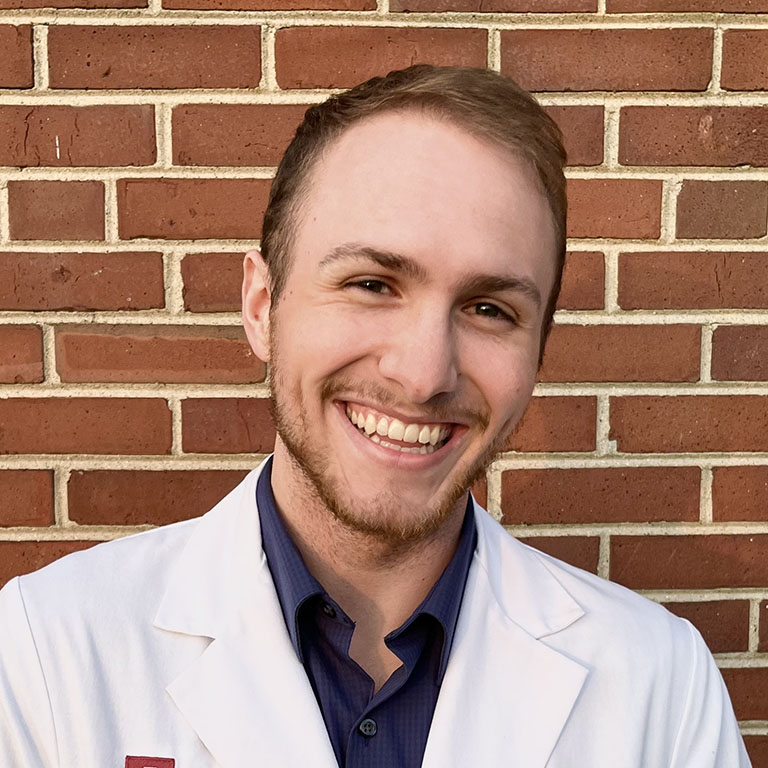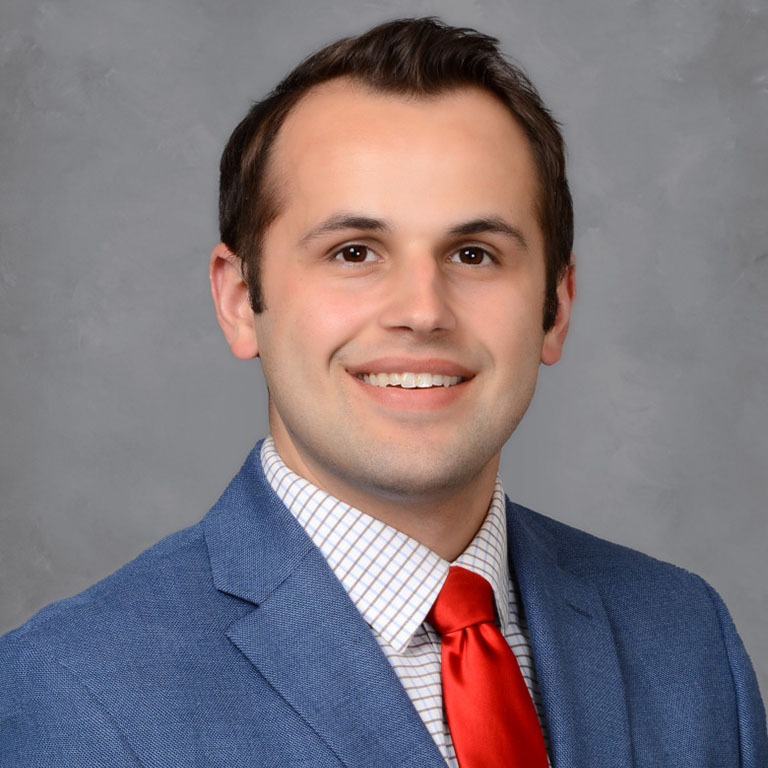by Cindy Dashnaw Jackson
June 30, 2023
Cancer Patients Deserve Holistic Care, Say 2023 Wright Scholarship Awardees
Noah Burket and Jon-Luc Poirier, the 2023 William J. Wright Scholarship awardees, share a belief: A cancer diagnosis affects every part of a patient’s life and the lives of those around them. Their research should help the medical industry better recognize and mitigate those effects.
Noah Burket

Noah Burket heard the call to practice medicine through individuals whose lives were overturned in an instant: a cousin paralyzed in a four-wheeler accident, one aunt with polio and another with lung cancer and metastatic brain cancer, and a stranger with whom Burket shared a “sacred moment.”
“I saw a cancer patient go from joy to hopeless sadness when his oncologist told him he was out of treatment options,” Burket said. “I realized that I wanted to serve patients in these delicate times, guiding them through both their medical treatment and the challenging discussions around their quality of life and mortality.”
Cancer invades a patient’s life to an extent not always acknowledged by oncologists, Burket said.
“For instance, with my aunt whose lung cancer developed into brain cancer—of course it affected her, but she moved in with my other aunt, the one with the paralyzed son, so they all had a lot to deal with,” Burket said. “Then there are a whole bunch of socioeconomic issues at play in caring for patients with cancer. I’ve read patient notes about someone having to ask for a $20 gas card to see their child during their (cancer) recovery phase. Cancer is life-changing for the patient and their family and friends. It’s why you have to build a relationship of trust that’s unique to this field.”
Burket has dedicated much of his research to neuro-oncology, the study of brain and nervous system tumors.
“Unlike other organs, everything that makes you ‘you’ is in your brain and nervous system. So when you hear something is wrong in your brain, it shocks people to their core,” he said. “Survival rates depend on a lot of factors. Even with tumors that aren’t fatal, when surgeons have to remove a tumor from your spinal cord, a myriad of issues and risks go along with that.”
The scholarship will allow Burket to research the effects of geographic differences, socioeconomic factors, treatment protocols and other factors that potentially affect a cancer patient’s quality of life and mortality.
“I have had a long-standing love of working in clinics serving low- to no-income patients and hope to bridge all my interests in a career in neuro-oncology,” he said. “The Wright Scholarship will fund experiences that will give me tools to care for neurological patients holistically and push the field forward through discoveries from research.”
Thanks to the scholarship, Burket will revisit research with Dr. Angela Richardson from his first year of medical school: data on surgery in patients with brain metastases during the COVID-19 pandemic. The collected data already shows a statistically significant delay in time from diagnosis to surgery in these patients as well as an increase in the patient population overall, Burket said.
“It’s important to know why these [results occurred] so we might mitigate those issues if another pandemic occurs. We’ve mainly just done data collection here in Indiana. The Wright Scholarship will allow me to seek data from other institutions to see if the delay happened elsewhere and if other factors were present.”
Burket will spend the next year in an IU School of Medicine MedSTAR Research Fellowship project, shadowing and being mentored by IU Simon Comprehensive Cancer Center neurosurgeons and neuro-oncologists
“We’ll be working on discovering the driver of the NF2-subtype of pediatric spinal ependymoma,” Burket said. “Kids with NF2 disease get tumors throughout their nervous system and even in the peripheral nerves. They’re benign for the most part, but the surgery to remove them can leave kids paralyzed. We think kids are more likely to get a specific type of tumor if they have a mutated NF2 gene, so our ultimate goal is to find a way to treat this population before they get the tumor.”
Burket feels a strong sense of responsibility toward his patients.
“I will be the last human some patients see, so I need to be more than just a physician for them,” he said. “Discoveries I make in the lab could change treatment options in the clinic, and patient experiences that I have in the hospital may provide new avenues for research.”
Jon-Luc Poirier

One goal has been driving Jon-Luc Poirier in his cancer research projects: Safeguarding day-to-day living for cancer patients who develop bone cancer.
“Metastatic bone cancer is a quality-of-life issue that’s been overlooked,” said the 2023 Wright Scholarship winner. “If a patient with lung cancer, for example, develops cancer in their bones, they’re at a greater risk of fracture, which will affect their pain, mobility and mortality. In fact, all kinds of conditions outside of the original cancer can increase fracture risk, but it hasn’t been comprehensively studied in cancer patients with metastatic bone disease.”
Poirier decided he wanted to be an orthopedic oncology surgeon with his first research project, studying molecules that would inhibit cancer cells’ growth with Edward Motea, Ph.D., in 2018.
“I’ve had family members who passed away from cancer, and metastatic bone disease in particular is such a complex medical issue with complex surgical outcomes for patients,” he said of his interest. “There’s been a lot of research trying to predict if patients with bone disease will fracture. If we can mitigate the risk, we should.”
Poirier’s many orthopedic oncology research projects and published articles include a podium presentation at the Musculoskeletal Tumor Society’s 2022 Annual Meeting, where he shared his novel CT imaging analysis techniques to characterize the impact of metastatic bone disease in renal cell carcinomas in a project led by Dr. Christopher Collier. Poirier is particularly interested in the role metastatic bone cancer plays in cancer cachexia, the wasting that’s seen when patients lose a significant amount of weight—which increases the risk of fracture and mortality. Poirier is part of Collier’s team testing whether a tumor’s location could accelerate cachexia development.
In other projects, Poirier and research teams have analyzed cases where surgeons operated to prevent fractures (such as inserting a rod or pin) and examined the types of tumors removed by orthopedic, plastic and general surgeons with an eye toward standardizing care. They have also found that one additional concurrent medical condition doesn’t increase a cancer patient’s chance of fracture but two or more do.
“Doctors must look at comorbidities. Our research highlights the importance of treating the patient overall and realizing that metastatic bone disease can have a greater, broader effect on a person beyond their cancer,” Poirier said.
About the Author
Cindy Dashnaw Jackson finds and tells nonprofit stories that inspire audiences to share, show up and support. She honed her ability to craft a message that fits an audience during 20 years in nonprofit PR and communications. Now a freelancer and founder of Cause Communications LLC, she's a copywriter and storyteller for nonprofits across the United States. And she earned her degree at IUPUI.
Learn more about the Wright Scholarship
For more information about the William J. Wright Scholarship Fund at IU Simon Comprehensive Cancer Center, contact Elizabeth Parsons at eparsons@iupui.edu.




